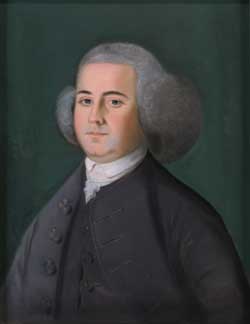The Debut of Representative John Adams
The Massachusetts General Court managed to get back to their usual meeting place on 4 June 1770—but only for that one special day.
That was King George III’s birthday, a holiday across the British Empire, on the previous week the legislature resolved to “joyously celebrate the happy Anniversary…in Token of their Loyalty to his Majesty…at the Representatives Chamber in the Town-House in Boston.”
This wasn’t an official session of the legislature, so the location wasn’t under the control of acting governor Thomas Hutchinson. But no one could complain that the move was unpatriotic.
The next day, Tuesday, the lower house had to go back to the campus of Harvard College in Cambridge, and it went back to quarreling with Hutchinson over having to meet there. The legislators asked to see his instructions from London. He answered that he was “not at Liberty to lay a Copy of those Orders before the House.”
On Wednesday, 6 June—250 years ago today—Boston held another town meeting in Faneuil Hall. This was necessary because one of the gentlemen the town had elected to the General Court in May, James Bowdoin, had just been elevated into the Council again.
The selectmen called for votes for a new representative, warning that “no Votes will be received but such as are unfolded.” Eligible voters lined up for the ballot boxes to the number of 536. When the ballots were tabulated, the officials announced that the town’s new representative, with 418 votes, was the lawyer John Adams.
Adams had served on a couple of important town committees that spring. He had also started to represent Capt. Thomas Preston and the British soldiers on trial for the Boston Massacre. While he later claimed that job made him unpopular, there’s no doubt that at this time the town’s leading Whigs and voting populace strongly supported him.
The meeting filled a couple more town offices, voted to ask the representatives to seek a day of “fasting and prayer through this Province,” and adjourned.
That afternoon, Adams entered the chapel in Harvard Hall and took the oath as a new representative, administered by his childhood acquaintance John Hancock.
The business of the house that day was how to respond to Hutchinson’s insistence on the Cambridge venue. By a vote of 96-6, with Adams recording his first vote in the majority, the house approved a long report repeating its complaint. Its last act that day was to create a committee of Samuel Adams, John Adams, John Hancock, James Warren, and Daniel Leonard to deliver that complaint to the acting governor. Yes, this was going to be a productive week.
That was King George III’s birthday, a holiday across the British Empire, on the previous week the legislature resolved to “joyously celebrate the happy Anniversary…in Token of their Loyalty to his Majesty…at the Representatives Chamber in the Town-House in Boston.”
This wasn’t an official session of the legislature, so the location wasn’t under the control of acting governor Thomas Hutchinson. But no one could complain that the move was unpatriotic.
The next day, Tuesday, the lower house had to go back to the campus of Harvard College in Cambridge, and it went back to quarreling with Hutchinson over having to meet there. The legislators asked to see his instructions from London. He answered that he was “not at Liberty to lay a Copy of those Orders before the House.”
On Wednesday, 6 June—250 years ago today—Boston held another town meeting in Faneuil Hall. This was necessary because one of the gentlemen the town had elected to the General Court in May, James Bowdoin, had just been elevated into the Council again.
The selectmen called for votes for a new representative, warning that “no Votes will be received but such as are unfolded.” Eligible voters lined up for the ballot boxes to the number of 536. When the ballots were tabulated, the officials announced that the town’s new representative, with 418 votes, was the lawyer John Adams.
Adams had served on a couple of important town committees that spring. He had also started to represent Capt. Thomas Preston and the British soldiers on trial for the Boston Massacre. While he later claimed that job made him unpopular, there’s no doubt that at this time the town’s leading Whigs and voting populace strongly supported him.
The meeting filled a couple more town offices, voted to ask the representatives to seek a day of “fasting and prayer through this Province,” and adjourned.
That afternoon, Adams entered the chapel in Harvard Hall and took the oath as a new representative, administered by his childhood acquaintance John Hancock.
The business of the house that day was how to respond to Hutchinson’s insistence on the Cambridge venue. By a vote of 96-6, with Adams recording his first vote in the majority, the house approved a long report repeating its complaint. Its last act that day was to create a committee of Samuel Adams, John Adams, John Hancock, James Warren, and Daniel Leonard to deliver that complaint to the acting governor. Yes, this was going to be a productive week.


No comments:
Post a Comment